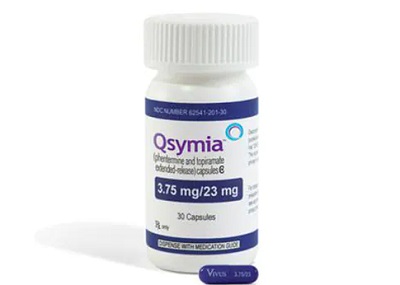
Qsymia is an oral weight loss medication that has been approved by the U.S. Food and Drug Administration (FDA). It is meant to be used in conjunction with a doctor-approved reduced-calorie diet, exercise and behavioral change program, to treat obesity in adults with a BMI of 30 or higher, or in adults with a BMI of 27 or higher and who also have a weight-related medical condition (e.g. high blood pressure, high cholesterol, diabetes).
What is Qsymia?
The official website for this brand name diet drug claims that, on average, taking Qsymia once per day as recommended can help you lose 24 pounds or more and keep it off, lose 4 inches or more off your waist, and achieve nearly 10% average percent weight loss.
Phentermine and topiramate are the two active medications in Qsymia. In essence, both work to help a person suppress their appetite. This can be very beneficial for an overweight or obese individual who has difficulty controlling their appetite and who need help sticking to a diet that is lower in calories.
More specifically, phentermine is a sympathomimetic amine that affects the nervous system and helps to suppress a person’s appetite. Topiramate is an antiepileptic. Although it is primarily used in the treatment of epilepsy, it can also assist in making an individual feel full.
How Does This Prescription Diet Pill Work?
Qsymia reportedly works in two main ways. The first is it helps lower appetite so that a person can feel more satisfied with their smaller meals, resulting in them eating less. The second is it helps to decrease overeating at meals as well as snacking.
As is the case with any prescription medication for weight loss, there are side effects associated with Qsymia. The most common of these include: dry mouth, blurry vision, stomach upset, constipation, diarrhea, nausea, decreased appetite, sleeplessness, unpleasant taste in mouth, muscle pain, heartburn, rapid heartbeat, back pain, urinary tract infections, upper respiratory infections and abnormal movements or sensations in the fingers/arms/legs/toes. If you experience these or any other side effects, inform your doctor immediately.
Inform your doctor of your current and past medical history. Also let him/her know if you are pregnant, nursing or planning to become pregnant. Additionally, due to the potential for adverse drug interactions, let your healthcare provider know about any medications (prescription or non-prescription) or dietary supplements that you may be taking.
Qsymia should be taken exactly as it has been prescribed. You should not increase or decrease your dose without first consulting your doctor as this could result in a higher risk of adverse side effects. The dosage that is prescribed to you will be based on your medical condition and your response to treatment. If you feel that this dosage should be changed, bring up your concerns with your doctor.
* This article is for informational purposes only and not to be taken as medical advice. Always consult with your doctor before making any changes to your medications, supplements, diet, or exercise routine.